Porter
Wagoner

-
Inducted2002
-
Born
August 12, 1927
-
Died
October 28, 2007
-
Birthplace
Howell County, Missouri
Noted for his onstage jokes, rhinestone-studded stage wardrobe, and duet partnership with Dolly Parton, Porter Wagoner became a revered elder statesman for country music in the 1990s.
Butcher Shop Beginnings
Porter Wagoner was born in an Ozark Mountain region of Missouri steeped in ancient English balladry. A farm boy, he moved with his family to West Plains, where he married in 1946.
Wagoner formed the Blue Ridge Boys band and by 1950 was singing over local radio (KWPM) out of the butcher shop where he cut meat. His big break came when Springfield, Missouri, radio station KWTO hired him in 1951. Wagoner signed with RCA Records the following year, but because his early records didn’t sell well, he committed himself to a hard-traveling career of playing schoolhouses for gate proceeds only. His act was billed as the Porter Wagoner Trio, with Don Warden on steel guitar and Herschel “Speedy” Haworth on rhythm guitar.
Wagoner’s “Trademark,” co-written with Gary Walker, went to #2 for Carl Smith in 1953, and Wagoner’s hits penned by other writers, including “Company’s Comin’” (#7, 1954-’55) and “A Satisfied Mind” (#1, 1955), kept him on RCA. He was an early mainstay on the ABC television show Ozark Jubilee (1955-’56), but he moved to Nashville with his wife and three children in 1956 and joined the Grand Ole Opry the following year.
Songs
00:00 / 00:00
00:00 / 00:00
00:00 / 00:00
Lights, Camera, Action!
In 1960, Wagoner was invited by the Chattanooga Medicine Company to front a syndicated television show. He immediately broadened his act, adding comedian Speck Rhodes, singer Norma Jean, and, eventually, Mack Magaha (fiddle), George McCormick (guitar), and Buck Trent (banjo). The Porter Wagoner Show featured celebrities such as Tex Ritter and Cowboy Copas, plus newcomers including Willie Nelson and Waylon Jennings, and ran for an impressive two decades, ending in 1981.
As his TV show’s reach expanded into nearly one hundred markets, with over three million viewers, Wagoner ran up a string of hits that included “Misery Loves Company” (#1, 1962), “I’ve Enjoyed As Much of This As I Can Stand” (#7, 1962-’63), “Sorrow on the Rocks” (#5, 1964), “Green, Green Grass of Home” (#4, 1965), “Skid Row Joe” (#3, 1965-’66), “The Cold Hard Facts of Life” (#2, 1967), and “The Carroll County Accident” (#2, 1968-’69). Unlike some of his colleagues, Wagoner utilized, but never pandered to, the Nashville Sound and never traded his flashy rhinestone suits for tuxedos. The versatile performer also won three Grammys for sacred recordings with the Blackwood Brothers (1966, 1967, 1969).
Dolly Parton replaced Norma Jean in The Porter Wagoner Show’s cast in 1967, and she and Wagoner began recording duets, including fourteen Top Ten hits and one #1, “Please Don’t Stop Loving Me” (1974). Wagoner was their de facto producer-arranger on thirteen duet albums, and he also supervised Parton’s RCA solo output during the same period. While Parton eventually outshone Wagoner on the charts, he nevertheless prospered from his tireless efforts in building her career. Although Parton’s departure from the show in 1974 led to angry words and legal action, the two eventually resolved their differences.
Videos
“Poison Love” with Chet Atkins and Dolly Parton
The Porter Wagoner Show, 1973
“A Satisfied Mind”
The Porter Wagoner Show, 1962
As his syndicated TV show expanded into nearly one hundred markets, with over three million viewers, Porter Wagoner ran up a string of hits.
Photos
-
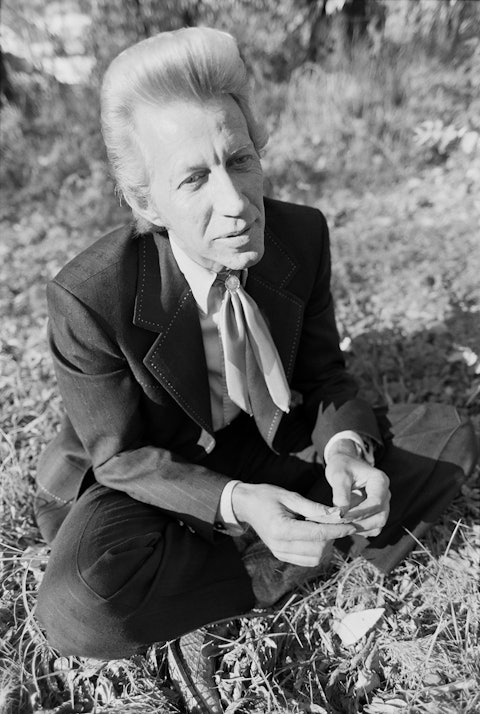
Porter Wagoner, 1975. Photo by Raeanne Rubenstein.
-
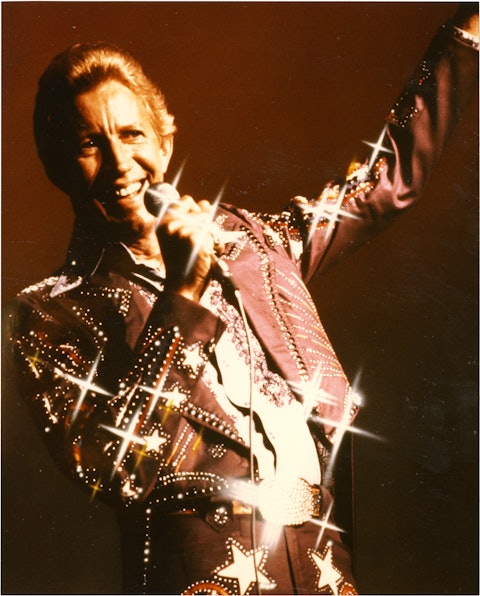
Porter Wagoner, 1985. Photo by Walden S. Fabry Studios.
-

Porter Wagoner, 1985. Photo by Walden S. Fabry Studios.
-
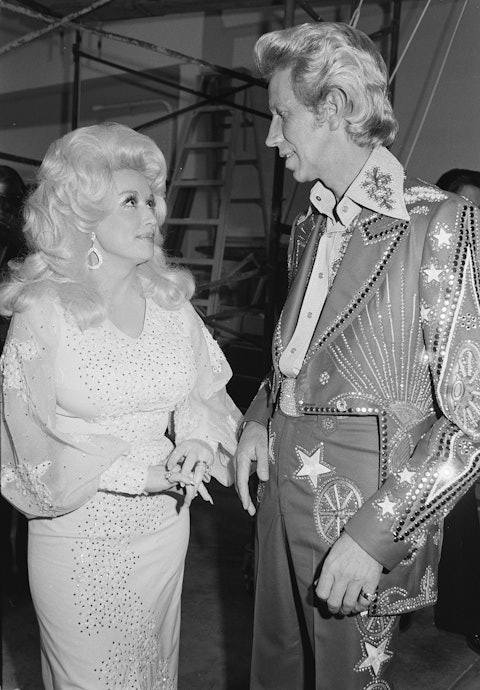
Porter Wagoner and Dolly Parton backstage at the Country Music Association Awards, 1975. Photo by Raeanne Rubenstein.
-
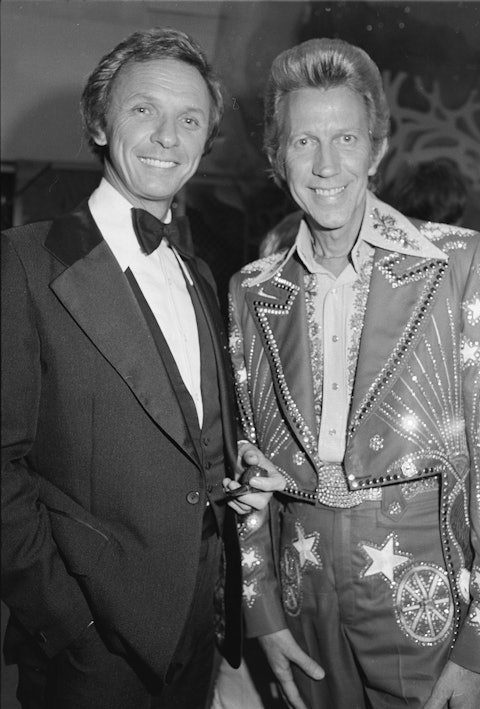
Porter Wagoner and Mel Tillis backstage at the Country Music Association Awards, 1975. Photo by Raeanne Rubenstein.
-
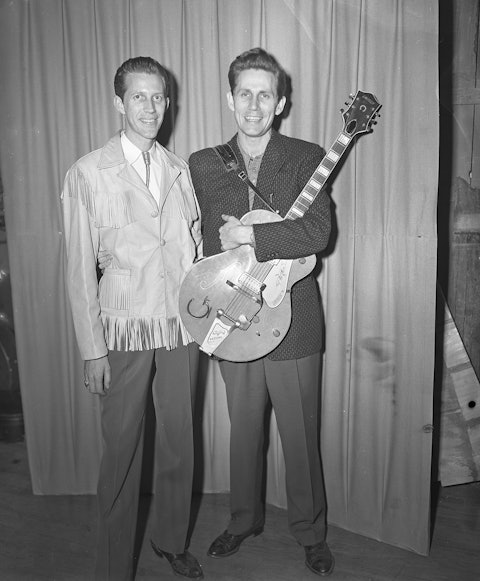
Porter Wagoner with Chet Atkins, c. 1957. Photo by Elmer Williams.
-
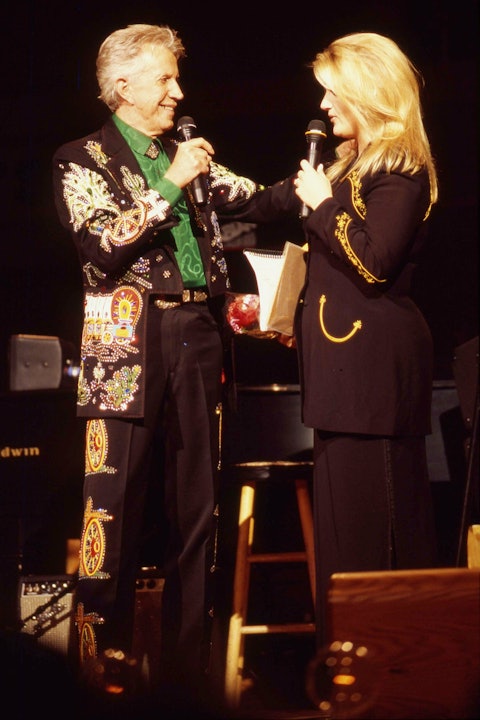
Porter Wagoner and Trisha Yearwood at Yearwood’s Grand Ole Opry induction, 1999. Photo by Raeanne Rubenstein.
-
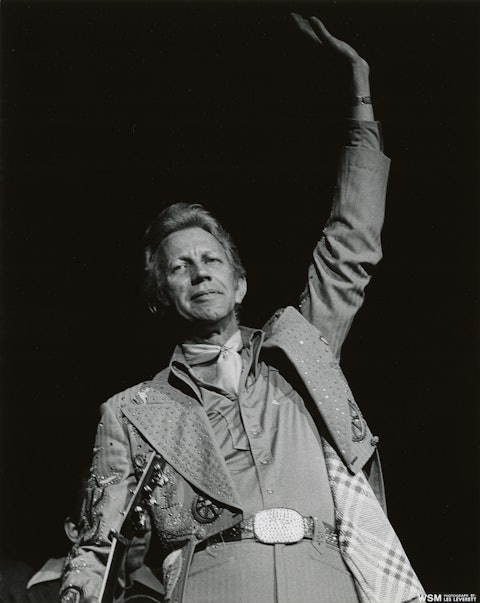
Porter Wagoner at the Grand Ole Opry, 1976. Photo by Les Leverett.
-
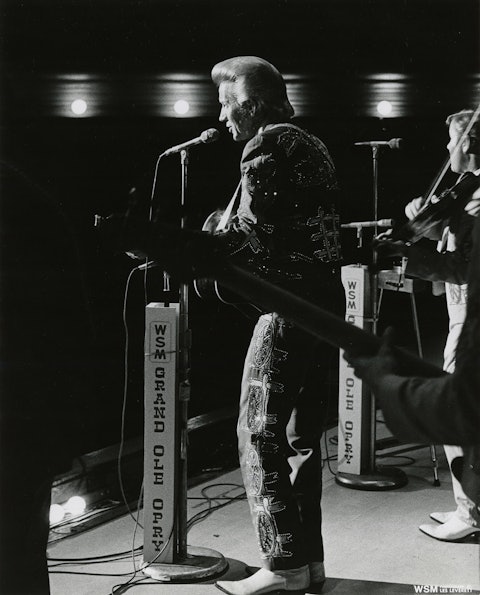
Porter Wagoner performs at the Grand Ole Opry, 1976. Photo by Les Leverett.
-
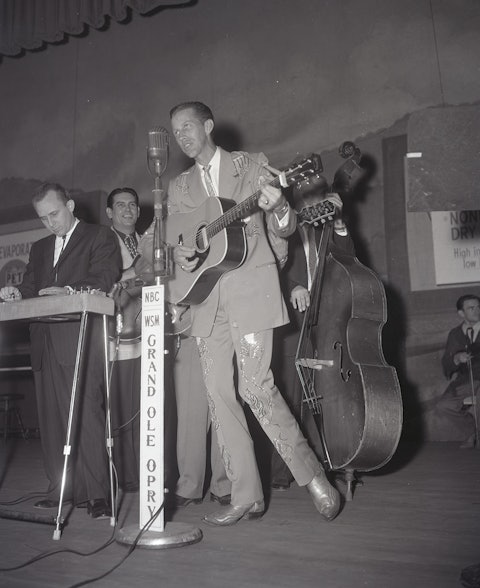
Porter Wagoner performs at the Grand Ole Opry. Photo by Elmer Williams.
A Grand Ole Opry Mainstay
Wagoner’s post-Parton career reflected his persistently upbeat, eager-to-experiment persona. He brought soul great James Brown to the Grand Ole Opry, produced R&B sessions for Joe Simon, appeared in the Clint Eastwood film Honkytonk Man (1982), and served as an Opryland tourist ambassador in the 1990s. Starting in 1992, Wagoner co-hosted the Nashville Network’s Opry Backstage for nearly a decade.
In the wake of Roy Acuff’s death in November 1992, Wagoner became the unofficial spokesperson for the Grand Ole Opry. An Opry mainstay until his death in October 2007, Wagoner was honored in May of that year for his fifty years as an Opry member.
Wagoner’s final album, Wagonmaster, released in June 2007, was produced by Marty Stuart and drew rave reviews and feature articles in the New York Times and No Depression. That July, he opened for the White Stripes at Madison Square Garden.
—Steve Eng
Adapted from the Country Music Hall of Fame® and Museum’s Encyclopedia of Country Music, published by Oxford University Press



